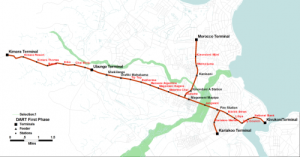by Ben Taylor
Floods cause chaos once again
The annual event that is flooding in Dar es Salaam has once again caused several days of transport chaos in the city. Two days of solid rain rendered many roads impassable, paralysed transport networks and caused extensive delays. Police had to step in to manage the crisis.
Hundreds of residents of the city fled their flooded homes and sought shelter elsewhere. The hardest hit areas included Tegeta, Kawe, Sinza, Msasani, Masaki, Oysterbay, Kinondoni, Tandale, Mbezi and Kimara.
In Jangwani, Kariakoo, Kigogo, Buguruni, Ilala Sharif Shamba and Tabata Dar es Salaam residents paid the price of clogged drainage systems and roads. Many homes were submerged, causing considerable suffering. The flood waters reportedly also claimed at least three lives.
The Prime Minister, Mizengo Pinda, reported to parliament that the flooding had caused Tsh 9.5bn worth of damage, mostly to road networks.
Dar es Salaam Bus Rapid Transit launch imminent
Trials of the long-awaited Dar es Salaam Bus Rapid Transit (BRT) commuter bus system are underway, along with training for drivers. The system, also known as DART, is expected to be formally launched and to become fully operational in October. The project was launched in Sept 2010 by President Kikwete (see TA 98).
The buses will operate along purpose-built routes following major roads into the City from the west. The principle route is 20km long, following Morogoro Road from Kimara, through Ubungo and into the City Centre to Kivukoni. Additional routes from Kariakoo and along Kawawa Road from the Morocco junction connect into the main route. (See map)
Along these routes, a fleet of 76 buses, each carrying up to 150 passengers will replace current daladala services along these routes. Daladalas will continue to operate elsewhere in the city, including feeder routes connecting passengers to the BRT system.
Once the system is fully operational, the new buses are expected to carry 350,000 passengers per day.
The trials are taking place without conductors, with passengers instead paying their fares through swipe cards, similar the Oyster card system that operates in London. Bus fares have not yet been announced by the Surface and Marine Transport Regulatory Authority, SUMATRA.
The BRT project is financed by the World Bank and the government at a cost of more than TSh 400bn and covers construction of roads, main terminals, depots and feeder stations. It is designed to reduce traffic congestion, particularly into the City Centre. Estimates made by DART in 2010 stated that about USD 2.5 million was being lost daily in the city through decreased productivity, wasted fuel and late delivery of products resulting from traffic jams. (The Guardian)

